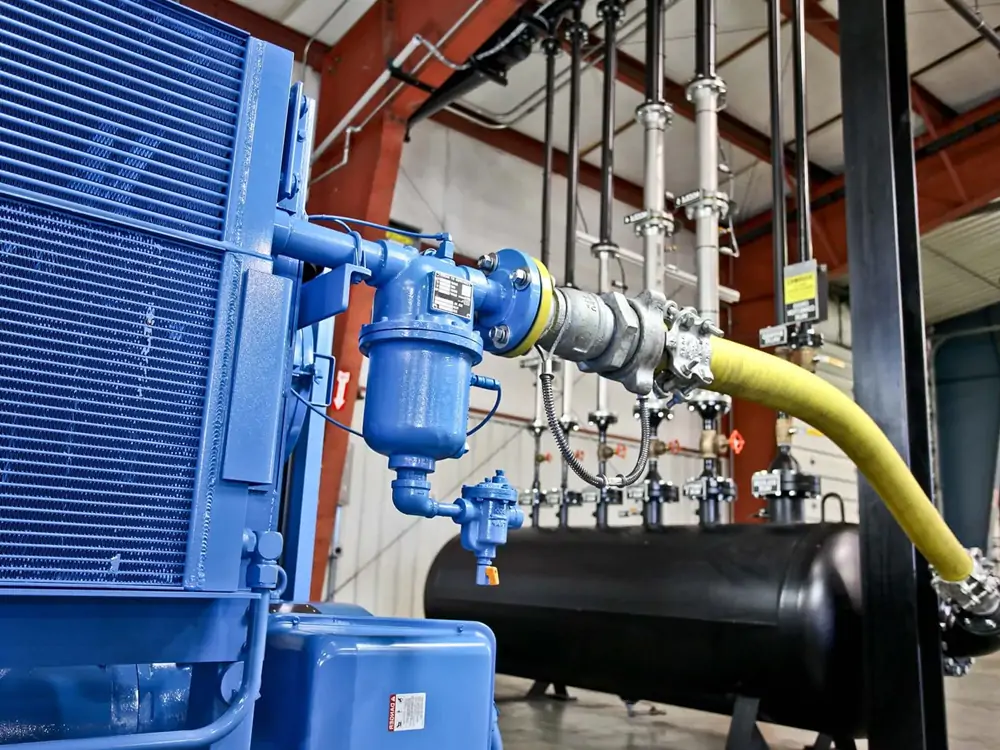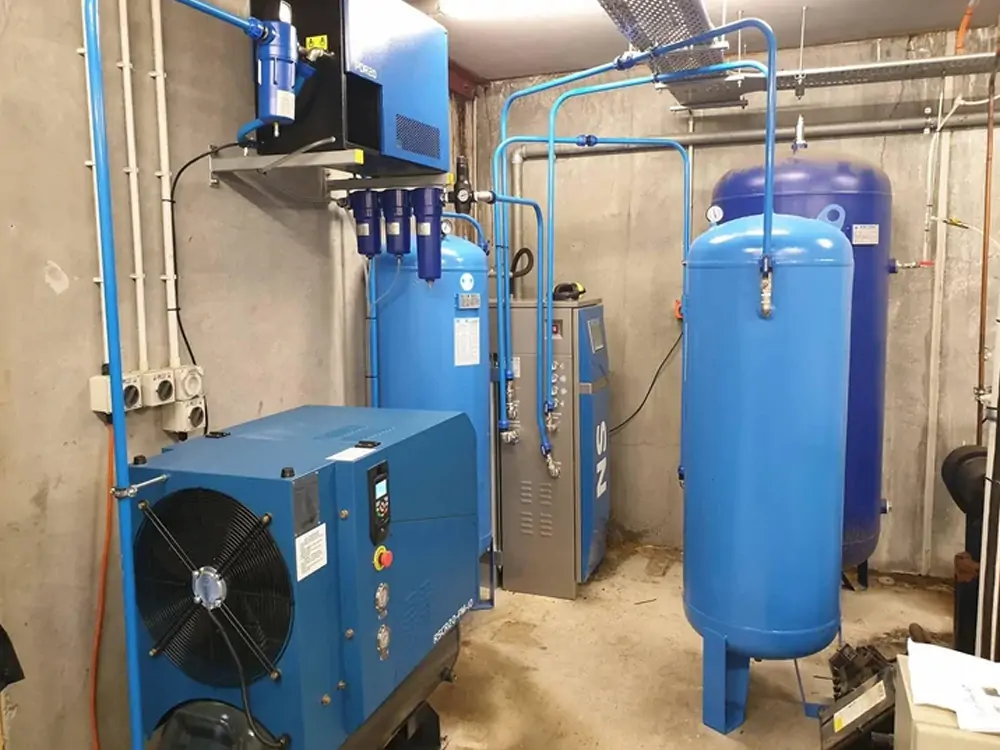When discussing industrial manufacturing or other applications requiring compressed air, air quality is an often overlooked but crucial element. We often focus on ensuring our compressed air systems provide enough pressure to drive equipment. But we rarely consider the humidity and purity of the air. This is where compressed air dryers become essential.
This article explores why compressed air dryers are indispensable equipment in many situations. We’ll look at when you might need a compressed air dryer. Whether you are an industrial manufacturer or use compressed air daily, this article will help you better understand why you should consider investing in a quality compressed air dryer. Let’s explore how this seemingly small but important device can have a profound impact on a variety of applications.
Where Does The Water in Compressed Air Come From?
The moisture in compressed air comes primarily from the atmosphere. This is inherent in the natural air. Regardless of the season, the atmosphere has a certain relative humidity. In addition, after compression or cooling, the water vapor in the air will become liquid. This affects the quality of compressed air.
In industrial air compressor applications, many users are very sensitive to moisture. Since we can’t eliminate the water before the air compressor, it must remove moisture in the compressed air treatment system.
Before entering the air compressor, the moisture in the air is mainly water vapor. And it is unsaturated. As shown in Sheet 1, the relative humidity of the air is 69%, and the temperature is 20°C. After compression (7 bar), the water vapor in the compressed air becomes saturated because of the cooling of the rear cooler of the air compressor. And 42% of liquid water will be precipitated. A gas-water separator and storage tank can remove this liquid water. The remaining 58% of water is in the compressed air as water vapor.
If there is no air compressor dryer, the direct use of compressed air will be bad for production. Therefore, refrigerated and desiccant air dryers have become the preferred air treatment equipment.
There are three general requirements for the water content of compressed air.
① The air compressor discharges compressed air. If there is a cooler + air receiver, then it can lower the temperature by 3 to 10 ℃. This can meet customers with low-quality air, such as drilling rigs, air cannons, etc.
② But most industrial enterprises generally have such requirement :10℃>pressure dew point>0℃. This requires using an air compressor refrigerated dryer to remove the water vapor.
③ If the need for dew point ≤ 0 ℃, choosing a desiccant air compressor air dryer is necessary. The common dew point requirements for adsorption compressed air dryers are -20℃, 40℃, and 70℃.
What Are The Specific Problems That Arise?
The air compressor discharges the compressed air, but it is not clean. There are many contaminants, such as moisture, dust particles, oil, etc. They will enter the production process if they are not purified and dry. Moreover, many screw air compressors are oil-type. This leads to many problems.
Production Capacity Decline
If there is no air dryer compressed air, moisture, and oil will clog and rust pneumatic equipment and tools. This causes slow operation. Besides, clogged lines and parts will lead to lower pressure. And the tools will lose efficiency. In a long time, the equipment will break down. In severe cases, this can lead to production downtime.
Increase Product Defect Rate
High water content in compressed air leads to an increase in product failure rate. For example, spray painting and electronic product processing. In laser or plasma cutter machines, moisture will pollute the lenses on our cutter heads. So, it will directly affect the cutting efficiency.
In addition, various influence exists in the food industry. Compressed air often plays a role in food packaging and transportation. Also, compressed air often comes into contact with the product.
If there is no air compressor air dryer, then much moisture or oil can damage our food. Especially in the dry food industry, there are more strict requirements for air humidity. ISO standards have different classes for compressed air quality in the food industry. Different levels have different contents of solids, water, and oil.
Air Aerodynamic Loss
Water in compressed air will corrode the pipes. This leads to pipe blockage. Moreover, mixing water, oil, and dust can exacerbate blockages. Besides, in cold regions, moisture freezing can cause pipes to freeze. Then the pressure drops and the pressure difference is large. Eventually, it will affect the safety of production. In addition, it will lead to air leakage from the pipeline in serious cases.
So it needs the refrigerated compressed air dryer and desiccant air compressor dryer to remove water.
Increase Production And Maintenance Costs
Moisture and oil will directly damage our pneumatic components. Besides, they will also corrode our equipment. Then we have to replace the spare parts with new ones. This increases both the maintenance cost and the production time cost.
To improve compressed air quality, you must install precision filters to remove oil and water. Then, install an air compressor air dryer to remove the water deeply. This brings the dew point to reach the application requirements.

What Can Compressed Air Dryers Bring You
A compressor air dryer is a device used to process compressed air. It improves compressed air quality by removing moisture and other impurities from the air. Below are some of the main functions the air compressor dryer can perform.
Dehumidification
Compressed air often contains significant amounts of moisture, harming many applications. Compressed air dryers remove moisture from the air through technologies such as cooling, adsorption, or membrane separation. This prevents moisture from corroding, icing, or other problems with equipment and processes.
Purify
The air may contain particulate matter, grease, bacteria, and other impurities. These impurities can cause problems in some sensitive applications. Air dryer compressed air can filter these impurities and provide cleaner and purer compressed air.
Improve System Efficiency
Dehumidification and purification of compressed air can improve the efficiency of compressors and pneumatic equipment. Dry air transports energy more efficiently, reduces corrosion on pipes and equipment, and reduces maintenance costs.
Extend Equipment Life
Compressed air dryers can extend the life of compressors, valves, and other critical components by reducing damage to equipment from moisture and impurities, downtime, and repair costs.
Ensure Product Quality
In some manufacturing processes, compressed air is used to carry raw materials or participate directly in the manufacture of products. If the air contains moisture or contaminants, this may adversely affect product quality. Air dryer compressed air ensures that products are free from contamination and meet quality standards.
When Do You Need A Compressed Air Dryer
There are many situations where you might need an air compressor dryer. It depends on your application and environment. Below are some common situations.
Pneumatic Equipment
If you work with pneumatic tools, control systems, or machinery, dry compressed air is essential to their proper operation. Moisture can cause stuck valves, leaky cylinders, or tool failure.
Precision Manufacturing
In precision manufacturing, such as electronics, semiconductor, or optical manufacturing, tiny water droplets or particles in the air can cause damage to products. The air compressor dryer ensures the required air quality during production.
Food And Pharmaceutical Industry
In food and pharmaceutical production, hygiene standards are very strict. Moisture and contaminants can pose a threat to product safety and quality. Dry compressed air helps avoid these problems.
Cooling And Freezing Applications
In cooling and freezing systems, dehumidified compressed air helps prevent freezing and frost and maintains stable system operation.
Painting And Coating
If you use compressed air in automotive painting, woodworking, or other coating applications, moisture, and oils can adversely affect the quality of the coating. A compressed air dryer ensures uniform coating and good quality.
Gas Production
Certain gas production processes require extremely high-purity gases, and dehumidification and purification of compressed air are key steps in producing high-purity gases.
Avoid Pipeline Corrosion
Moisture and contaminants can trigger corrosion in pipes and vessels. This may cause leakage or damage to the equipment. Compressor air dryers protect equipment and infrastructure from such hazards.
Energy Saving
Dehumidified compressed air requires less energy to transport. Drying air, therefore, reduces energy costs and increases system efficiency.

Conclusion
In this article, we dig into the importance of air compressor dryers and when to consider using them. Whether it is industrial manufacturing, precision manufacturing, food processing, pneumatic equipment, or other applications, compressed air quality is one of the key factors in ensuring system efficiency and product quality.
A compressed air dryer can be a seemingly small and easily overlooked device. But it is critical to many industries and applications. Ensuring your compressed air is of the right quality can increase productivity, reduce maintenance costs, and ensure product quality. So, whether you need a compressed air dryer depends on your needs. But considering them is often a smart choice that can provide lasting benefits to your workflow and business.
